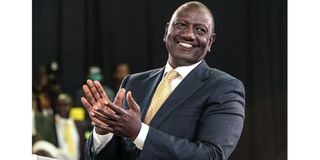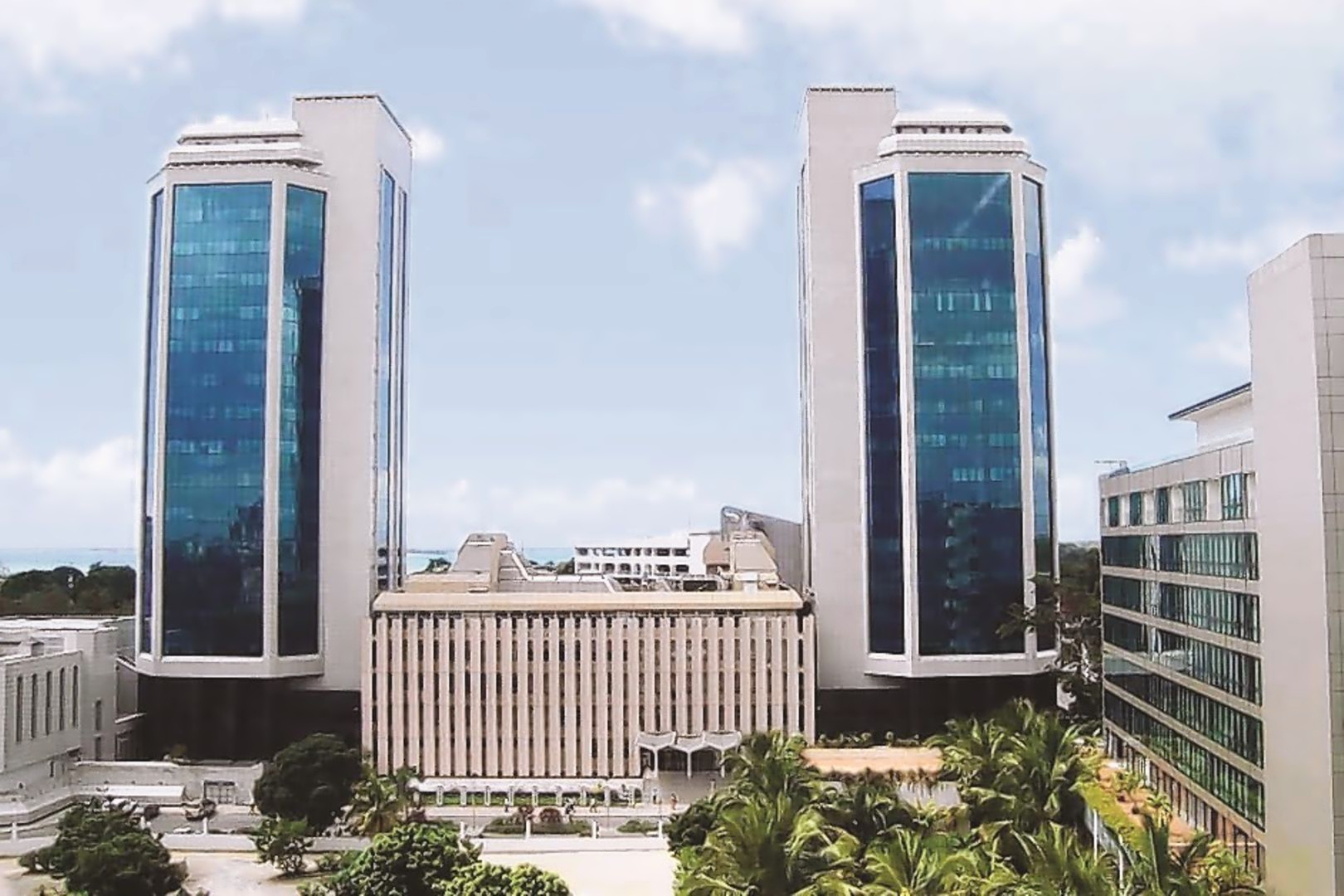Prime
President Ruto embraces ‘dynasties’ as string of U-turns grows

Kenyan President William Ruto
What you need to know:
- Dr Ruto had also vowed not to co-opt the opposition into his administration, but following the Gen Z protests, he appointed five of Mr Odinga’s allies to his Cabinet.
President William Ruto, who swept to power through the backing of the majority poor—popularly known as “hustlers”—has made a U-turn and sought political protection from the “dynasties” he aggressively campaigned against.
It is the latest in a growing list of contradictions by the President, including going back on his word not to humiliate his deputy, the promise not to unleash State machinery against opponents, assurances he would not let opposition into government, and defending abductions by persons believed to be police officers.
In the run-up to the 2022 presidential election, Dr Ruto endeared himself to the poor by selling the “hustler versus dynasty” narrative to groups generally typified as boda boda, unemployed youth and mama mboga.
In the narrative, he depicted himself as a hustler, a self-made, streetwise politician who had pulled himself up against the odds, as he raged against dynasties, the scions of wealthy and rich parents out to block him from gate-crashing their privileged club.
In the campaigns, he labelled opposition leader Raila Odinga and former President Uhuru Kenyatta as members of the dynasty, blaming them for the poverty facing a majority of Kenyans.
However, just slightly over two years after assuming power, President Ruto turned to the dynasties for protection against the perceived hostility from those who supported him, especially from the Mt Kenya region.
This major political contradiction adds to a growing list of U-turns that have characterised his two years in office, including shunning of Prof Kithure Kindiki as his running mate in favour of Mr Rigathi Gachagua, only for him to instigate the impeachment of the latter.
“The process of impeachment is provided for in the Constitution, and what we witnessed was a parliamentary process subjected to judicial oversight. Prof Kindiki has demonstrated a remarkable trajectory of growth as a leader and maturity as a politician. His time was always going to come,” State House Spokesperson Hussein Mohammed told the Nation in defence of the President.
Gen Z protests
Dr Ruto had also vowed not to co-opt the opposition into his administration, but following the Gen Z protests, he appointed five of Mr Odinga’s allies to his Cabinet.
The President has also found himself on the spot over alleged abductions, especially during the youth-led protests. He had vowed there would never be extra-judicial killings in his administration.
Barely months after a truce with Mr Odinga, Dr Ruto last week reached out to Mr Kenyatta, in what his critics described as the highest betrayal of the hustlers.
For the first time since ascending to power, the President had kind words for his predecessor, describing him as a “statesman”. Previously, the Kenya Kwanza administration had accused Mr Kenyatta of sponsoring anti-government protests.
University lecturer David Monda observed that the truce between Dr Ruto and the dynasties confirms the old adage that there are no permanent friends or enemies in politics, just interests.
“It shows Ruto’s capacity to be a political pragmatist not only on the mechanics of playing politics but on the long-term vision of how to play politics. He will adjust his political strategy to cater for sudden changes in the political landscape—like Gachagua’s impeachment and Raila’s ODM joining the government,” said Prof Monda.
He, however, noted that such major U-turns reinforce perceptions that the President is weak and is desperately trying to find a way to hold onto power at the expense of his pre-election promises to the electorate.
“These U-turns have their unintended consequences. They are also making a leader like Ruto appear indecisive in his position. That is to say, these multiple U-turns put the pursuit of power before principle. This can make a President like Ruto lose credibility (not being a man of his word) and legitimacy (loss of faith from core base supporters),” he added.
Kitui Senator Enoch Wambua, a close ally of Wiper party leader Kalonzo Musyoka, said the hustler narrative in President Ruto’s campaign was “the real hot air of all times” and the greatest betrayal by a government.
Class war
“The Ruto administration has now turned to eat the same people it had promised to save from the so-called dynasties. But give it to him, Ruto managed to trigger a class war in our country and took full advantage of the widening gap between the haves and the have-nots, knowing very well that he did not have a solution to bridge the gap,” Mr Wambua said.
“The mama mboga and boda boda riders who had banked on the bottom-up promise are today crying out to be saved from the Ruto oppression. When was the last time you heard President Ruto mention the wheelbarrow after the elections? He knew from the beginning that all he needed was to use sound bites, whip emotions and win the presidency,” said the senator.
Jubilee Secretary-General Jeremiah Kioni said that the President has realised that he cannot run the country by excluding others. He said that it has since dawned on him that governing goes beyond sloganeering to dealing with real issues.
“He underestimated the demands of the people. That is why he seems to be scared about people who are not with him. His was to conquer and control, but he did not have any plan for the country, that is why he is bound to contradict his previous stance,” said Mr Kioni.
But Mr Mohammed accused the President’s critics of grossly misunderstanding the “principle of inclusiveness as a fundamental imperative for national stability and progress”.
“This is a most absurd reading of events. It is premised on the crude fallacy that the government has abandoned the Hustler Nation and run into the arms of oligarchs and plutocrats. On the face of it, that would be suicidal political calculus. The Bottom-Up Transformation Agenda promotes strategies to achieve inclusiveness, beginning with the majority, who are at the bottom of the socio-economic pyramid, and going upwards,” he said.
“If the Kenya Kwanza administration had been anti-dynasties as it is claimed, it would focus solely on the bottom to the exclusion of the top or up. The directionality in bottom-up is not accidental, it denotes the
President’s intentional endeavour to achieve inclusiveness, beginning with the majority and leaving no one behind,” he explained.
Allies of the President, including the Central Organisation of Trade Union Secretary-General Francis Atwoli, described the inclusion of allies of both Mr Odinga and Mr Kenyatta as a good move for the country’s economic growth. He said the appointments reflect the President’s “unwavering effort to create a government that transcends political divides, bringing together seasoned political leaders and individuals from diverse political persuasions”.
“As COTU (K) we believe that the current calibre of individuals within the Cabinet will not only promote unity but also enrich decision-making processes through the contestation of ideas and thus ultimately addressing the challenges facing Kenyan workers and in advancing the socio-economic welfare of all Kenyans,” he said.
Similar views were shared by Nyaribari Chache MP Zaheer Jhanda.
“He is the leader who wants to bring about unity by including everyone, even the ones who never believed in him,” he said.
In the run-up to the 2022 polls, Dr Ruto vowed not to allow his DP to be humiliated the same way he was humiliated following his falling out with his then boss, Mr Kenyatta.
“I would not allow my Deputy President to be humiliated the way former deputy presidents have been humiliated and the way I have been humiliated,” said President Ruto. But leading up to Mr Gachagua’s removal, the President said nothing as his allies took shots against his deputy.
In September while in New York, the President praised Ford Foundation for safeguarding the country’s democracy, barely two months after he accused the foundation of financing the nationwide youth-led protests that forced him to withdraw the contested Finance Bill, 2024 and the subsequent dissolution of his Cabinet.
Global economic institutions
“Kenya appreciates the Ford Foundation’s commitment to safeguarding our democracy and supporting Kenya’s calls for reforms in the global economic institutions, climate action and modern technology regulation,” Dr Ruto said after he held talks with the foundation’s president Darren Walker. In July, he had linked the foundation to the youth-led protests, accusing it of causing anarchy.
“We ask the Ford Foundation to explain to Kenyans its role in the recent protests. We will call out all those who are bent on rolling back our hard-won democracy,” President Ruto said in a public address.
At the height of his falling out with Mr Kenyatta and in the run-up to the last elections, President Ruto sustained a narrative that it was because of the March 8, 2018 handshake between the former President and Mr Odinga that Jubilee was unable to deliver on its agenda. He took the narrative to an internal platform during his Chatham House address in London in March 2022.
“Today in Kenya, we have a mongrel of a government system. You don’t know whether it is the government that is in opposition or the opposition is the one that is in government,” he said.
But when he reconstituted his Cabinet, Dr Ruto incorporated five senior opposition figures in his administration—Mr Opiyo Wandayi (Energy and Petroleum), Mr John Mbadi (National Treasury), Mr Hassan Joho (Mining and Blue Economy), Wycliffe Oparanya (Cooperatives and MSMEs) and Beatrice Askul (EAC and Asals).
But Mr Mohammed said any perceived contradictions stem from “impatient conjecture, incomplete conclusions drawn from insufficient evidence, and biases that hinder the recognition of facts as they are”.
“The President is not just co-opting leaders from rival formations helter-skelter. He is methodical and strategic, aiming to harness inclusiveness to deliver transformation. What we have is not a mongrel by any stretch of the imagination; we have a well-thought-out political innovation to enhance performance, accelerate delivery, and promote unity. This is what bottom-up inclusiveness looks like,” he said.
He added: “There is a certain transformation of the soul of our nation at the level of its core energy that occurs when we are willing to accept that political competition does not mean mutual sabotage ... Unity is a thing, and, at this point in Kenya’s development, it is everything.”



